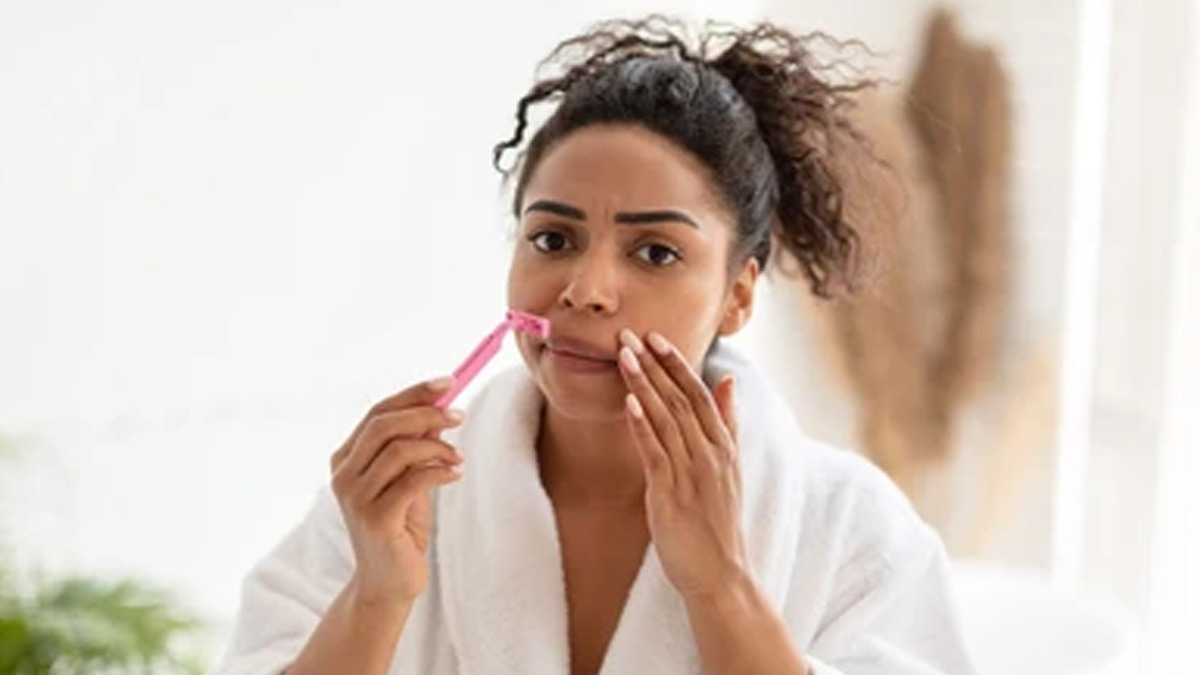
We usually associate hair thinning as we grow older. However, in many cases, people notice an increase in unwanted facial hair with age, especially in perimenopausal women and a few years after menopause. Talking to the Onlymyhealth team, Dr Rajya Laxmi, Senior Consultant, Dermatologist, Apollo Hospitals, Secunderabad, associated this increase in facial hair with hormonal imbalance.
Table of Content:-
Hormonal Changes Cause Unwanted Facial Hair In Women
“As you grow older, facial hair can get coarser on the chin and around the lips. That is normal. However, if it is the result of a potential medical concern, that can be known by a few diagnostic methods,” said Dr Laxmi. She listed:
- A detailed history
- Medical examination
- Investigating hormonal levels
- Abdomen and pelvis ultrasound abdomen
- MRI or CT of the adrenal region

Talking about what causes unwanted facial hair, Dr Laxmi said, “The primary cause of increased unwanted facial hair often stems from hormonal imbalances, notably a decrease in estrogen secretion from the ovaries accompanied by continuous androgen production that causes a spike in testosterone.”
Medical Conditions Causing Excessive Facial Hair
Various medical conditions contribute to excessive facial hair growth and are categorised into ovarian and adrenal causes.
Ovarian Factors
Ovarian factors include:
- Polycystic Ovarian Syndrome (PCOS): A hormonal disorder common among women of reproductive age, characterised by cysts on the ovaries, irregular menstrual cycles, and elevated levels of androgens.
- Ovarian Tumours: Abnormal growths that develop in the ovaries, which can be benign or malignant and may produce hormones, leading to various symptoms and complications.
Adrenal Causes
Adrenal causes include these conditions:
- Cushing's syndrome: A disorder characterised by excessive levels of cortisol in the body, often caused by prolonged exposure to high levels of the hormone.
- Androgen-producing tumours: Abnormal growths that develop in the adrenal glands or ovaries, leading to overproduction of androgens, such as testosterone.
- Congenital adrenal hyperplasia (CAH): A genetic disorder where the adrenal glands produce insufficient cortisol and aldosterone, often due to a deficiency in the enzyme 21-hydroxylase.
- Hyperandrogenic-Insulin Resistant-Acanthosis Nigricans Syndrome (HAIRAN): A rare condition characterised by high levels of androgens, insulin resistance, and the presence of acanthosis nigricans, a skin disorder causing dark patches.
- Hyperprolactinemia: A condition marked by elevated levels of prolactin hormone in the blood, which can disrupt normal reproductive function and lead to various symptoms.
- Androgenic drugs: Medications that mimic the effects of androgens, often used for hormone replacement therapy or to treat certain medical conditions.
- Idiopathic hirsutism (IH): Excessive hair growth in women with no identifiable underlying cause, often considered a cosmetic concern.
Also Read: Suffering From PCOS? Follow These Diet Tips To Prevent Your Risk Of Getting Diabetes

How To Manage Unwanted Facial Hair?
“There are many ways to manage unwanted facial hair. But the most important thing is first to find and treat the underlying cause,” said Dr Laxmi. She listed a few methods to manage unwanted facial hair:
- Epilation Methods: Epilation methods such as plucking, shaving, threading, tweezing and waxing. These moths are inexpensive and simple, but they are also temporary and can have side effects like rashes, folliculitis, irritant dermatitis or pigmentary changes.
- Electrolysis: Electrolysis is another option for hair removal. According to the Journal of the American Academy of Dermatology, electrolysis is a technique used to permanently remove unwanted hair from the body. Electrolysis targets individual hair follicles to prevent future growth. The process involves inserting a fine, sterile probe into the hair follicle and delivering a small electrical current to destroy the hair root.
- Laser Hair Removal: More than epilation or electrolysis, laser hair removal has become more popular and the preferred choice to remove unwanted facial hair.
Dr Laxmi concluded that understanding these underlying factors is crucial for effectively managing and treating excessive facial hair growth in women. Consulting with a healthcare professional can help diagnose any potential medical conditions and develop appropriate treatment strategies to deal with hormonal disorders and unwanted facial hair.
Also watch this video
How we keep this article up to date:
We work with experts and keep a close eye on the latest in health and wellness. Whenever there is a new research or helpful information, we update our articles with accurate and useful advice.
Current Version